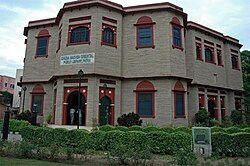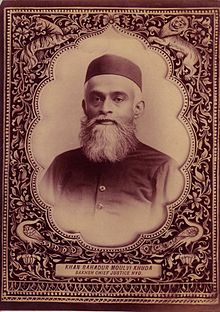Khuda Bakhsh Oriental Library
| Khuda Bakhsh Oriental Library | |
|---|---|
 | |
| Location | Patna, Bihar, India, India |
| Type | National library |
| Established | 29 October 1891[1] |
| Collection | |
| Items collected | Manuscripts, books, journals, newspapers, magazines, sound and music recordings, patents, databases, maps, stamps, prints and drawings etc |
| Size | 2,082,904 (printed books) 21,136 (manuscripts) (5,000,000 total items) |
| Legal deposit | Yes, Institution of National Importance by Act of Parliament, 26 December 1969 |
| Access and use | |
| Access requirements | Open to anyone with a genuine need to use the collection |
| Other information | |
| Director | Shayesta Bedar, (since January, 2019) |
| Website | http://kblibrary.bih.nic.in/ |
Khuda Bakhsh Oriental Library is one of the national libraries of India,[2] located in Patna, Bihar.[3] It was opened to public on 29 October 1891 by Khan Bahadur Khuda Bakhsh with 4,000 manuscripts, of which he inherited 1,400 from his father Maulvi Mohammed Bakhsh. It is an autonomous organization under Ministry of Culture, Government of India, and is governed by a Board with the Governor of Bihar as its ex officio Chairman, and is known for its rare collection of Persian and Arabic manuscripts. It also hosts paintings made during the Rajput and Mughal eras of India.
It is also a designated 'Manuscript Conservation Centre' (MCC) under the National Mission for Manuscripts.[4]
History
[edit]
The person
[edit]In 1895, he was appointed Chief Justice of the High Court of Nizam's Kingdom. After staying there for almost 3 years, he returned to Patna again and started practicing. But soon he was suffering from paralysis and he limited his activity to the library only. Due to his illness, he could not complete his activities. Rs.8000 to pay debt and library secretary and Rs. 200 were sanctioned as pension. He could not recover from paralysis and died on August 3, 1908.
Library
[edit]The library finds its origin in private collection of a bibliophile Mohammad Bakhsh and expanded by his son Khuda Bakhsh, who inherited 1,400 manuscripts and continued to add to the collection and eventually converted it into a private library by 1880. The library was opened to public upon its inauguration by Sir Charles Alfred Elliott, Governor of Bengal on 5 October 1891. After partition in 1947, Dr. S.V. Sohoni played a key role in ensuring that the collections were retained in India.[5] In 1969 through a Federal Legislation, an Act of Parliament, namely 'Khuda Bakhsh Oriental Public Library Act' (1969), the Government of India declared Khuda Bakhsh Oriental Public Library a centre of national importance and government took over the funding, maintenance and development of the library. Today it continues to attract scholars from all over the world.[6]
Past directors of the library have been Dr. Abid Reza Bedar, who after remaining with the Raza Library, came as Director to the institution in 1972, and did some important work towards reviving the library along with his successor Habibur Rehman Chighani, at present the Director of the library is the Dr. Shayesta Bedar, since April, 2019. It is on its way to become the country's first library to computerize its hand written collection for universal dissemination.,[7]
In 2021, the demolition of parts of the historic library building was proposed as part of a project to construct a flyover.[8] This has sparked controversy and several activists and organisations including INTACH have appealed against the demolition.[9]
Collection
[edit]Some of the notable manuscripts are Timur Nama (Khandan--Timuria), Shah Nama, Padshah Nama, Diwan-e-Hafiz and Safinatul Auliya, carrying the autograph of Mughal Emperors and princes and the book of Military Accounts of Maharaja Ranjit Singh. Apart from it the library also has specimens of Mughal paintings, calligraphy and book decoration and Arabic and Urdu manuscripts, including a page of Quran written on deer skin.[6][10]
There are 21,136 manuscripts in the library of Arabic, Persian, Urdu, Turkish and Pashto languages.[11]
The library also has a manuscript of Sahih al-Bukhari hand-transcribed by Shaykh Muhammad ibn Yazdan Bakhsh Bengali in Ekdala, eastern Bengal. The manuscript was a gift to the Sultan of Bengal Alauddin Husain Shah.[12]
See also
[edit]References
[edit]- ^ "Khuda Bakhsh Oriental Public Library (Historical Perspective)". kblibrary.bih.nic.in. Retrieved 21 January 2018.
- ^ "Destinations :: Patna". Archived from the original on 18 September 2014.
- ^ "Patna's Khuda Bakhsh library continues to draw foreign scholars". 10 May 2019.
- ^ Manuscript Conservation Centres Archived 6 May 2012 at the Wayback Machine National Mission for Manuscripts.
- ^ Godbole, Sanjay (31 March 2002). "Nirapekśa Samśodhaka (निरपेक्ष संशोधक)". Lokasatta (लोकसत्ता) (Mumbai), Lokaraṅga supplement (लोकरंग पुरवणी). p. 3.
- ^ a b "Islamic knowledge house, Khuda Bakhsh Library retains glory". Outlook. 8 July 2005. Archived from the original on 31 January 2013.
- ^ "Pride of Patna".
- ^ Kuchay, Bilal. "Portion of India's historic Khuda Bakhsh library faces demolition". www.aljazeera.com. Retrieved 25 May 2021.
- ^ Tewary, Amarnath (11 April 2021). "INTACH opposes 'proposal' for partial demolition of Khuda Bakhsh library". The Hindu. ISSN 0971-751X. Retrieved 25 May 2021.
- ^ "Ahluwalia, wife visit Khuda Bakhsh Library". The Times of India. 19 November 2009. Archived from the original on 3 November 2012.
- ^ "Khuda Baksh Oriental Public Library, Patna | Ministry of Culture, Government of India".
- ^ Mawlana Nur Muhammad Azmi. "2.2 বঙ্গে এলমে হাদীছ" [2.2 Knowledge of Hadith in Bengal]. হাদীছের তত্ত্ব ও ইতিহাস [Information and history of Hadith] (in Bengali). Emdadia Library. p. 24.
Further reading
[edit]- Khuda Buksh, S. (1912). Essays Indian and Islamic. London: Probsthain & Co.
- Salahuddin Khuda Bakhsh and Sir Jadunath Sarkar. Khuda Bakhsh. Patna, 1981.
